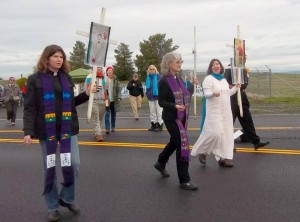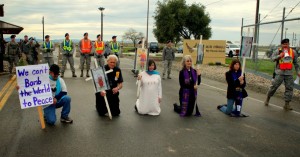
photo by Janie Kesselman
Five people – including members of the clergy and veterans – were arrested during an Ash Wednesday service around 8 a.m. today, March 5, at the gates of Beale Air Force Base, site of the surveillance drone Global Hawk.
Participants, who were charged with trespassing, said they risked arrest to memorialize the children killed by the U.S. government’s fleet of killer drones. Beale’s drones perform reconnaissance work for U.S. Predator drones.
The demonstrators spread ashes memorializing those of children killed by U.S. drones overseas.
Arrested were Rev. Sharon Delgado, Nevada City; Rev. Elizabeth Griswold, Davis/Sacramento; Reverend Dr. Gerald O. (Jerry) Pedersen, an 89-year-old WW II U.S. Marine, retired Lutheran pastor, Sacramento; Flora Rogers, Marysville and Michael Kerr, a veteran, Baypoint.
Rev. Pedersen was on the Battleship USS Missouri that accepted the Japanese surrender on Sept. 2, 1945.
It is the fourth action resulting in arrests at Beale Air Force Base in about a year. Eight people have been convicted in U.S. Federal Court, and another trial is set for next month.
Wednesday’s Ash Wednesday service included a call to faithfulness and action, songs, prayers, scripture, Holy Communion (open to all), and the use of ashes to symbolize repentance and to acknowledge our mortality and interrelatedness with the whole web of life.

photo by Guarionex Delgado
Some carried white crosses with drawings memorializing children killed by U.S. drones.
“We issued a call to repentance for the harm done to the Indigenous people who used to live where Beale is now, the harm being done to Mother Earth by our building and deploying high-tech weapons and weapons of mass destruction, the harm done to families and communities who suffer cutbacks in public services while billions are spent for the military, the overall harm caused by the global reach of U.S. military power,” said Sharon Delgado, one of the clergy arrested. She was also arrested last year at a protest at Beale.
The Things that Make for Peace
Sharon Delgado delivered this message at the Ash Wednesday worship service at Beale Air Force Base.
As Jesus came near and saw the city, he wept over it, saying, “If you, even you, had only recognized on this day the things that make for peace! But now they are hidden from your eyes. Indeed, the days will come upon you, when your enemies will set up ramparts around you and surround you, and hem you in on every side. They will crush you to the ground, you and your children within you, and they will not leave within you one stone upon another; because you did not recognize the time of your visitation from God.” Luke 19:41-44
When Jesus was heading toward Jerusalem, he stopped along the way. He wept over the city and the disaster that was coming if things didn’t change, if people didn’t turn around. Jesus wept.
I can identify with him, and you may, too, since you’ve come out all the way to the gates of Beale on this rainy day so early in the morning. There is a lot to weep over as we look at our world today. I believe that God weeps over the harm we human beings cause each other, and calls us to another way: away from personal, social, and institutionalized sin and to the way of justice, peace, and caring for the earth.
Jesus told his friends that peacemakers are blessed. But just what are the “things that make for peace?” First, we need reconciliation. As we stand here today, when environmental destruction, violence, and war threaten to consume the earth, we remember that we stand in the presence of the Great Mystery, the Creator and Source of the universe, who is experienced in an infinite number of ways and is called by many different names by the peoples of the earth.
God is here. Do we recognize the time of our visitation from God?
I am so glad that people of different faith traditions are joining us here today. We acknowledge the need to make amends, to foster understanding, and to live in unity in order for cycles of violence to end. We pray for reconciliation with people of varied philosophies and spiritual understandings. We pray for reconciliation with God, with all peoples, and with the whole community of life.
Second, we need repentance. Today we focus on our participation and complicity in systems that cause harm. Those of us here who are Christian acknowledge and lament the harm done by Christian imperialism. We repent for Christian complicity in systems of domination, violence, war, genocide, and ecocide. We call all Christians to repent of harm caused, turn away from today’s systems of violence, and turn toward the nonviolent Jesus of Scripture. He walked softly on the earth, created a community of compassion and inclusion, preached good news to the poor, spoke truth to power, and lived and died for Love. Those who follow him are called to do the same.
We recognize where we stand at this pivotal time in human history. We stand in the heart of a nation that has more political, economic, and military power than has ever before existed on earth. This nation was built on the blood of Indigenous peoples and on the labor of slaves, immigrants, and the poor. Our government promotes and supports a global system of unrestrained free market capitalism, dominated by corporations.
The United States is the primary enforcer of this global system, which is ravaging the earth and the human community. Our government is engaged in endless war, including drone strikes, unrestrained by international law. This cycle of destruction and death, paid for by our tax dollars, should stop, and the resources should be released for meeting human need.
This is institutionalized sin. We repent for the violence in our own hearts and lives and our complicity in our government’s actions. We call on the President and other government leaders to repent of the harm being caused and to radically change course, to turn away from war and to work for peace, justice, and the healing of the earth. We call on drone pilots, military personnel, and civilians to listen to the call of conscience, turn away from supporting war and begin the hard work of building a culture of peace.
Third, we need resistance–nonviolent resistance–following the example of Jesus. Theologian William Stringfellow said, “The integrity of resistance to the power of death is the only way to live humanly.” In times of great social evil, the only way to maintain our humanity, and our inner peace, is to live in resistance to the domination systems that bring death. Roger Gottlieb, in his book, The Spirituality of Resistance, made the point that living in resistance is the only way we can truly accept the reality of the dangers that threaten our world. How can I accept that my grandchildren are facing a disastrous future unless I am doing all in my power to prevent that from happening? Besides, as they say, “In resistance is the secret of joy.” And I mean today. Today there is no place I’d rather be.
Standing here at the gates of Beale, we express our resistance to the inhumanity of drone warfare, on behalf of the families and children of Afghanistan and Pakistan, of Yemen and Somalia, and of every nation on earth. We express our resistance to drone warfare on behalf of our own children and grandchildren, and those who will come after. We commit ourselves to working tirelessly to stop the endless cycle of violence so that future generations can live in peace.
It’s good to weep. It means we’re not in denial. We, like Jesus, know that if we don’t turn things around, the earth community and our children’s children face disaster.
But God is in our midst, calling us to reconciliation, repentance, and resistance to the dominant systems of our day. The Spirit is inspiring us, empowering us, and working through us to help create a world of peace, justice, and fruitfulness that can sustain life through all generations.
One of the baptismal vows in the United Methodist Church is this: “Do you accept the freedom and power God gives you to resist evil, injustice, and oppression in whatever forms they present themselves?” As we stand here at the gate of Beale Air Force Base and the Global Hawk Drones, we say “yes.”

